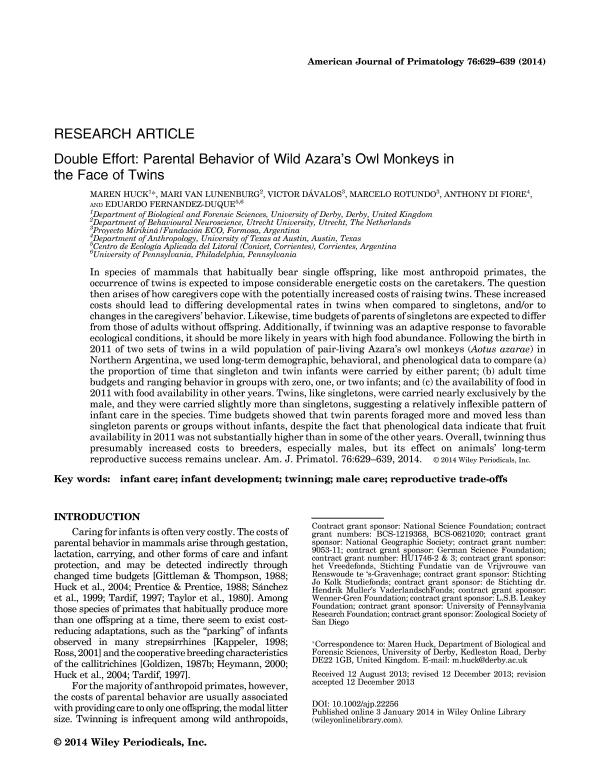Mostrar el registro sencillo del ítem
dc.contributor.author
Huck, Maren
dc.contributor.author
Van Lunenburg, Mari
dc.contributor.author
Dávalos, Victor
dc.contributor.author
Rotundo, Marcelo
dc.contributor.author
Di Fiore, Anthony
dc.contributor.author
Fernandez Duque, Eduardo

dc.date.available
2016-12-29T13:45:15Z
dc.date.issued
2014-01
dc.identifier.citation
Huck, Maren; Van Lunenburg, Mari; Dávalos, Victor; Rotundo, Marcelo; Di Fiore, Anthony; et al.; Double effort: parental behavior of wild Azara's owl monkeys in the face of twins; Wiley; American Journal Of Primatology; 76; 7; 1-2014; 629-639
dc.identifier.issn
0275-2565
dc.identifier.uri
http://hdl.handle.net/11336/10578
dc.description.abstract
In species of mammals that habitually bear single offspring, like most anthropoid primates, the occurrence of twins is expected to impose considerable energetic costs on the caretakers. The question then arises of how caregivers cope with the potentially increased costs of raising twins. These increased costs should lead to differing developmental rates in twins when compared to singletons, and/or to changes in the caregivers’ behavior. Likewise, time budgets of parents of singletons are expected to differ from those of adults without offspring. Additionally, if twinning was an adaptive response to favorable ecological conditions, it should be more likely in years with high food abundance. Following the birth in 2011 of two sets of twins in a wild population of pair‐living Azara’s owl monkeys (Aotus azarae) in Northern Argentina, we used long‐term demographic, behavioral, and phenological data to compare (a) the proportion of time that singleton and twin infants were carried by either parent; (b) adult time budgets and ranging behavior in groups with zero, one, or two infants; and (c) the availability of food in 2011 with food availability in other years. Twins, like singletons, were carried nearly exclusively by the male, and they were carried slightly more than singletons, suggesting a relatively inflexible pattern of infant care in the species. Time budgets showed that twin parents foraged more and moved less than singleton parents or groups without infants, despite the fact that phenological data indicate that fruit availability in 2011 was not substantially higher than in some of the other years. Overall, twinning thus presumably increased costs to breeders, especially males, but its effect on animals’ long‐term reproductive success remains unclear.
dc.format
application/pdf
dc.language.iso
eng
dc.publisher
Wiley

dc.rights
info:eu-repo/semantics/openAccess
dc.rights.uri
https://creativecommons.org/licenses/by-nc-sa/2.5/ar/
dc.subject
Infant Care
dc.subject
Infant Development
dc.subject
Twinning
dc.subject
Male Care
dc.subject.classification
Ecología

dc.subject.classification
Ciencias Biológicas

dc.subject.classification
CIENCIAS NATURALES Y EXACTAS

dc.title
Double effort: parental behavior of wild Azara's owl monkeys in the face of twins
dc.type
info:eu-repo/semantics/article
dc.type
info:ar-repo/semantics/artículo
dc.type
info:eu-repo/semantics/publishedVersion
dc.date.updated
2016-12-26T18:45:51Z
dc.identifier.eissn
1098-2345
dc.journal.volume
76
dc.journal.number
7
dc.journal.pagination
629-639
dc.journal.pais
Estados Unidos

dc.journal.ciudad
Nueva York
dc.description.fil
Fil: Huck, Maren. University of Derby; Reino Unido
dc.description.fil
Fil: Van Lunenburg, Mari. Utrecht Univeristy; Países Bajos
dc.description.fil
Fil: Dávalos, Victor. Fundación ECO; Argentina
dc.description.fil
Fil: Rotundo, Marcelo. Fundación ECO; Argentina
dc.description.fil
Fil: Di Fiore, Anthony. University of Texas at Austin; Estados Unidos
dc.description.fil
Fil: Fernandez Duque, Eduardo. University of Pennsylvania; Estados Unidos. Consejo Nacional de Investigaciones Científicas y Técnicas. Centro Científico Tecnológico Nordeste. Centro de Ecologia Aplicada del Litoral (i); Argentina
dc.journal.title
American Journal Of Primatology

dc.relation.alternativeid
info:eu-repo/semantics/altIdentifier/doi/http://dx.doi.org/10.1002/ajp.22256
dc.relation.alternativeid
info:eu-repo/semantics/altIdentifier/url/http://onlinelibrary.wiley.com/doi/10.1002/ajp.22256/full
Archivos asociados
